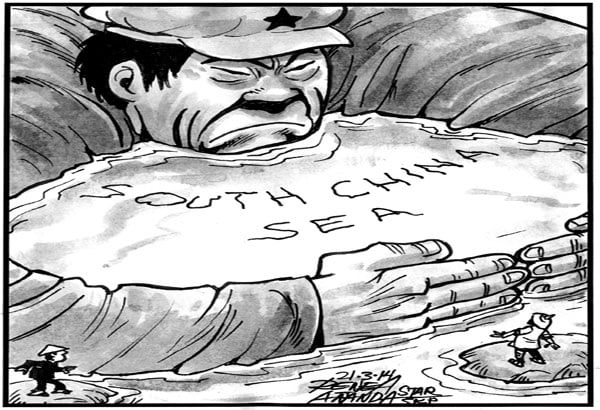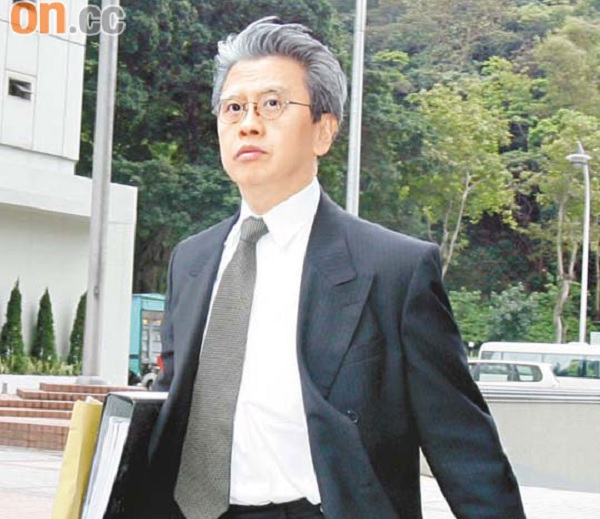
China’s “Territorial Greed” (Philippine Star)
As the world awaits a ruling from the Permanent Court of Arbitration (PCA) in the Hague on the dispute between China and the Philippines over maritime territories in the South China Sea, mainland Chinese media and the South China Morning Post (SCMP) in Hong Kong have breathlessly announced a “legal challenge” touted to bring “fresh uncertainty” to the case. This challenge comes in the form of an amicus curiae or “friend of the court” brief submitted by a legal organization called the “Asia-Pacific Institute of International Law” (亞太國際法學院, APIIL) in Hong Kong.
The brief submitted by APIIL questions the court’s jurisdiction in the matter of the disputed territories, citing “factual and legal errors” in the case. The substance of the brief and what these alleged “factual and legal errors” might be remain a mystery, however, since the brief itself has not been made available for public examination, nor has PCA yet issued a response.
“Our motives are not about arguing whether the Philippines or China is right,” said APIIL chairman Daniel Fung (馮華健), “Rather, we want to maintain the perfection of the international law system and the perfection of the arbitration tribunal which is one of the instruments of the system…. We are unwilling to see the international law system being jeopardised or its reputation being damaged.”
What these reports failed to note is that APIIL is a “legal organization” that hardly exists. It was registered as a business in Hong Kong only two months ago, has no website or public contact information, no prior history of legal practice, and no names associated with it other than “chairman” Daniel Fung. The reports also failed to note that Fung is a delegate to the Communist Party-led Chinese People’s Political Consultative Conference (CPPCC) in Beijing, or that he was found guilty of professional misconduct in Hong Kong in 2010.

Daniel Fung faces misconduct charges, 2010 (Oriental Daily)
Despite his claim of objectivity in the matter of the South China Sea dispute and his stated desire only “to maintain the perfection of the international law system,” Fung has an established record of pro-Beijing opinions dating back at least to 1997 on matters ranging from the independence of Hong Kong’s judiciary to Hong Kong’s democratic development to human rights in China to the question of whether China picks better leaders than the United States.
Mr. Fung has the right to his opinions on these matters, just as everyone in China has the right to agree with everything their government says. He also appears to be doing a fabulous job of bringing mainland Chinese “rights” to the people of Hong Kong. “His” opinions do, however, bring his expressed motives and objectivity in the matter of China’s maritime claims into question, as does his CPPCC membership.
Fung is also a founding governor of the China-United States Exchange Foundation (中美交流基金會, CUSEF). CUSEF poses as a non-political, non-governmental organization, but as Princeton political scientist and former deputy assistant to the Vice-President of the United States for national security affairs Aaron Friedberg notes, “it is funded by Hong Kong tycoons and [Chinese] state-owned enterprises and is supported and advised by government-linked entities including the Shanghai Institute for International Studies and the [People’s Liberation Army] Academy of Military Science.”
In 2010 Fung “was found guilty of failing to inform the Court of Appeal in 2005 about clauses of a legislative provision that were unfavourable to his client,” according to a report at the time from SCMP. For his misconduct Fung was censured and fined HK$300,000, or about US$40,000. SCMP was recently purchased by mainland Chinese e-commerce giant Alibaba, which pledged to maintain editorial independence. Its report on Fung’s legal challenge to PCA only repeated mainland Chinese reports, however, and mentioned nothing on Fung’s history of legal misconduct, his mainland Chinese ties, or APIIL’s prior non-existence as an organization.
This “legal challenge” is evidently nothing but a cheap trick to delay the court ruling with a fake “legal organization” thrown together by a pro-Beijing shyster lawyer solely for that purpose. Given such a delay China could perhaps build more artificial “islands” to cement its bogus “historical claims” and trumped-up “sovereignty” on the South China Sea.
How high up the food chain in Beijing this charade goes is anybody’s guess, but a good guess would be quite high given its wide coverage in state-run mainland media and treatment as a major new development: a typical Beijing shell game. Whatever its final ruling, the Permanent Court of Arbitration would be wise to ignore this nonsense.